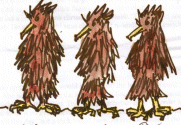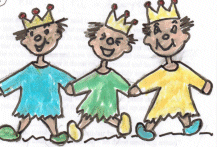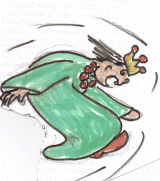|
. |
Na Trí Leinteacha de'n Cheanabhán Móna - The Three
Bog-Cotton Shirts Episode 6.

How they Celebrated together and all lived happily ever after
 'in é an lá bhí an lá a's blian suas agus go mbeadh an draoiocht tógtha desna
deartháireacha dá mbeadh na léinteacha deanta dhóibh aice-si. Bhi sí i n-áirde ar
na fugóidi agus í ag obair chomh dian is dob' fhéidir léi é ag criochnú an
triú léine. Duirt an duine uasal óg tine thabhairt do sna fugóidi anois.
Chuireadar an tine i seacht n-áit sa chruaich agus dá mbeidís ag ropadh agus
ag séideadh ó shin ní lasfadh aon fhúgóid i gcaoi go nduirt fear
críona tuigseanach a bhí ann : �Tá eagla orm ná bhfuil an ceart chun na mná
seo agus a rá ná tógann sí sin tine.� Thogadar na fir eile a gceann agus is
ró-gheárr go bhfeacadar trí preacháin ag teacht sa spéir i n-airde as a gcionn.
Tháinig ceann aca anuas ar ucht na mná. Do rug sí ar an gcead léine dhein sí agus
caith sí anuas ar an bpreachán í agus dhein buachaill breá calma glan de.
Tháinig an dára preachán anuas ar a gulainn dheis. Rug sí ar an dara léine dhein sí
agus chaith sí anuas ar an bpreachán í agus dhein buachaill de an uile blúire comh
deallraitheach leis an gcead bhuachaill. Tháinig an triú preachán ar an guallain clé.
Rug sí ar an léine bhí aici 'á chriochnú agus caith sí anuas ar
an bpreachán san í agus dhein buachaill breá óg de mar an gcéanna.
'in é an lá bhí an lá a's blian suas agus go mbeadh an draoiocht tógtha desna
deartháireacha dá mbeadh na léinteacha deanta dhóibh aice-si. Bhi sí i n-áirde ar
na fugóidi agus í ag obair chomh dian is dob' fhéidir léi é ag criochnú an
triú léine. Duirt an duine uasal óg tine thabhairt do sna fugóidi anois.
Chuireadar an tine i seacht n-áit sa chruaich agus dá mbeidís ag ropadh agus
ag séideadh ó shin ní lasfadh aon fhúgóid i gcaoi go nduirt fear
críona tuigseanach a bhí ann : �Tá eagla orm ná bhfuil an ceart chun na mná
seo agus a rá ná tógann sí sin tine.� Thogadar na fir eile a gceann agus is
ró-gheárr go bhfeacadar trí preacháin ag teacht sa spéir i n-airde as a gcionn.
Tháinig ceann aca anuas ar ucht na mná. Do rug sí ar an gcead léine dhein sí agus
caith sí anuas ar an bpreachán í agus dhein buachaill breá calma glan de.
Tháinig an dára preachán anuas ar a gulainn dheis. Rug sí ar an dara léine dhein sí
agus chaith sí anuas ar an bpreachán í agus dhein buachaill de an uile blúire comh
deallraitheach leis an gcead bhuachaill. Tháinig an triú preachán ar an guallain clé.
Rug sí ar an léine bhí aici 'á chriochnú agus caith sí anuas ar
an bpreachán san í agus dhein buachaill breá óg de mar an gcéanna.
|
19. The one year and a day was up that the spell would be lifted off the brothers
on condition that she had the three shirts made. She was up high on the huge heap of
firewood and she was working away as hard as she could at finishing the third shirt.
The young gentleman gave the order to set fire to the wood pile now. They tried to
set it on fire in seven places and if they were shoving blazing straw into it and
blowing on it till this day, not a stick would burn. At last the oldest of the men
said to the young gentleman, �I'm afraid that it is unjust to the young lady what
 we are doing because the wood won't burn !� The other men looked up and they
shortly saw three crows flying towards them in the sky. One of them landed on the
breast of the young lady and she quickly took the first of the shirts which she had
made and threw it over the crow's head and he became a fine, handsome young man. The
second crow came and landed on her right shoulder and she threw the second shirt over
its head and he became a fine, handsome young man every bit as fine as the first.
The third crow came and landed on her left shoulder and she seized the third shirt that
she had made and threw it over that crow as well. It too became a fine young man just
like the others.
we are doing because the wood won't burn !� The other men looked up and they
shortly saw three crows flying towards them in the sky. One of them landed on the
breast of the young lady and she quickly took the first of the shirts which she had
made and threw it over the crow's head and he became a fine, handsome young man. The
second crow came and landed on her right shoulder and she threw the second shirt over
its head and he became a fine, handsome young man every bit as fine as the first.
The third crow came and landed on her left shoulder and she seized the third shirt that
she had made and threw it over that crow as well. It too became a fine young man just
like the others.
|
20. �'S eadh anois a dheirfiúr, is fearr bhí ag duine riamh,� ars' an deartháir ba
shine, �labhair anois dúinn ché chuir sa leithéid d'áit thú.� �An té chuir
san áit seo mé � an duine uasal óg ansan,� ars' ise, �agus ní'l aon mhilleán
agam air, mar ní hé fé ndeara é acht a mháthair agus mara mbeadh é sin ní bheadh
sibhse anseo agamsa 'n-úr gcló féin fé mar a thá sibh, mar ní fhéadfainn an
puinte a dheanamh go brá mara mbeadh é sin agus an cognamh thug sé dhom.� D'innis
sí a scéal dóibh tríd síos ansan - cionnus a tháinig an mhathair agus gur
 bhris sí an cliabháinín lena gcos agus chuir scannra ar an leanbh mar chaith
sí ar an dtalamh é agus beagnach mhairbh sí é agus gach aon rud fé mar do thit
amach. Tháinig ana-trua ag a dheartharaibh dí, mar gheall ar a scéal agus
mar an gceanna do'n duine uasal óg. Agus a duirt an duine uasal óg léi: �Tabharfad-sa
sásamh duit sa méid sin, mar cuirfidh mé mo mháthair san áit go rabhais-se
agus tá sé ró-mhaith do bhhás dí, ná d'aoinne dheanfadh an obair do dhein sí.�
Togadh anuas an bhean óg ansan agus chuireadh i n-airde an tseana-chailleach
agus ní túisce cuireadh an chead shéidóg fé 'n gcruach ná gur bhladham sí suas
agus gur loisceadh 'n-a smúramán an tseana- chailleach.
bhris sí an cliabháinín lena gcos agus chuir scannra ar an leanbh mar chaith
sí ar an dtalamh é agus beagnach mhairbh sí é agus gach aon rud fé mar do thit
amach. Tháinig ana-trua ag a dheartharaibh dí, mar gheall ar a scéal agus
mar an gceanna do'n duine uasal óg. Agus a duirt an duine uasal óg léi: �Tabharfad-sa
sásamh duit sa méid sin, mar cuirfidh mé mo mháthair san áit go rabhais-se
agus tá sé ró-mhaith do bhhás dí, ná d'aoinne dheanfadh an obair do dhein sí.�
Togadh anuas an bhean óg ansan agus chuireadh i n-airde an tseana-chailleach
agus ní túisce cuireadh an chead shéidóg fé 'n gcruach ná gur bhladham sí suas
agus gur loisceadh 'n-a smúramán an tseana- chailleach.
|
20.�Well, aren't you the finest sister any man ever had before !� said the eldest
brother. �Speak up now and tell us who put you in a place like this.� �The one who
put me up here, is that young gentleman there,� she said, �but I lay no blame on him
because no one is responsible but his mother and only for him, I wouldn't have you
here in your own form as you are, because I could never have done anything without
his help.� She told the whole story then and how the mother had come and broke the
cradle with her foot and terrified the child as she threw it down on the ground
and how she almost killed it and how everything else had come about. The brothers
felt terribly sorry for her because of her story and the young gentleman also. �I
will give you revenge for all that because I'll put my mother up there where you were
and it's too good for anyone who would do the deed that she did.�The young lady was
taken down then and the old hag was put up in her place and she was no sooner
was the first brand shoved under the heap of wood than the fire blazed up and made
ashes of her.
|
|
21. Duirt an duine uasal óg, ansan, le n-a bhean go raibh súil aige go raibh deireadh
aici le n-a trioblóide agus nár ghá dhí dul thar n-ais go dtí an botháinín a
thuille: �Is liomsa,� ars'eisean, �na tighthe agus an ball so anois ó tá mo mháthair
marbh agus féadfair-se teacht agus an órdú agus riarú bheith agat
féin anois go
lá do bháis. �Téididh oraibh isteach a dhaoine uaisle,� ars' eisean le ne
deartháireacha. �Fán go fóilll,� ars' an deartháir ba shine, �Cá bhfuil an
páiste?� �Tá sé anseo agam,� ars' an deirfiur, �agus tá sé go h-ana mhaith ar fad,
ach amhain go bhfuil ceann d'á shúilibh i n-easnamh air.� �Fáire go brá, a
dheirfiúr,� ars' an deartháir críona, �do shilis deór !� �ó do shileas díreach,�
ars' ise, �nuair a chonnac an cor a bhí ar an bpáiste tar éis na seana-chaillighe
úd.� �Ar thit an deór ar an dtalamh uait ?� ars' eisean. �Níor thit,� ars' ise,
�mar do ghabhas am' haincisiúir é.� �An bhfuil an hainncisiúr agat ansan ?� ars'
eisean. �Tá,� ars'ise. �Tabhair dhom i leith é,� ars' eisean. Do thug agus is
amhlaidh a bhí súil an linbh istigh sa haincisiúir agus thóg sé an tsúil agus
chuir sé sa leanbh í comh maith is do bhí sí riamh.
|
21. The young gentleman then told his wife that he hoped that there was an end
to her troubles and that now there was no need for her to go back to the hut any more.
�I own all this land and the houses on it since my mother is now dead and all rule and
order is yours from now till the day of your death and you are all permitted to come in
as well,� he told the brothers. �Wait a while now,� said the eldest brother, �Where
 is the child ?� �I have it here,� said the sister, uncovering it and showing it to the
brothers, �and it is grand except that it lacks one eye.� �Oh,sister, you must have
shed a tear !� the eldest brother said. �I couldn't help it,� she said, �when I saw
the way that hag had left the child.� �Did the tear fall on the ground ?� he asked.
�No, it didn't,� she replied, because I caught it in my handkerchief.� �Have you got
that handkerchief there still ?� he asked. �I have,� she said. �Give over it to me,�
he said. They did so and what was in it but the child's eye, so they put it back in its
place and it as as good as it ever was.
is the child ?� �I have it here,� said the sister, uncovering it and showing it to the
brothers, �and it is grand except that it lacks one eye.� �Oh,sister, you must have
shed a tear !� the eldest brother said. �I couldn't help it,� she said, �when I saw
the way that hag had left the child.� �Did the tear fall on the ground ?� he asked.
�No, it didn't,� she replied, because I caught it in my handkerchief.� �Have you got
that handkerchief there still ?� he asked. �I have,� she said. �Give over it to me,�
he said. They did so and what was in it but the child's eye, so they put it back in its
place and it as as good as it ever was.
|
|
|
22. Is eadh, do thugadar an oiche sin ar fleadh agus ar mhór-fhéasta ag an nduine uaal
óg agus is iad a bhí go gáireach, pléisiúrtha i gcaitheamh na h-oiche. Ar maidin
amáireach, duirt an triúr dearthar gur chóir dóibh dul ag feicsint a n-athar,
feachaint cad é an aiste bhí air ag an gcailligh eile - �agus tá sé comh maith
agaibhse dul i n-éinfheacht linn,� ars' iad-san leis an lanamhain óig. �Támid sásta
leis,� ars' iad-san. Thógadar leo ansan cóiste cheithre gcapall fé dhéin chúirt'
a n-athar. In san slí dhóibh, ghlaodhadar fé dhéin na h-áite go raibh an bóthan
gur chaitheadar féin agus an caitín sealad ann, acht ní raibh tásc na tuairisc an
chaitín ná an bhóthainín rompa. Chomáineadar leó ansan fé dhéin chúirt a n-athar
gur shroiseadar ann. Is amhlaidh a bhí an tseana-chailleach rompa agus í féin 'na
máister agus máistris ar fad ar an dtig. D'dhiafraíeadar dí cá raibh a n-athair.
�Cé h-iad sibh-se nó cé hé bhúr n-athair ?� duirt sí Dúradar léi go neamh-mbalbh
gur b'é fear an ti seo. �ó ,� ars' ise, �tá sé ansan amú, istigh i seana-chró bó.
Cad dob'áil linn anseo istigh dhe?� �'Seadh ! Mhuise ! Caithfir é leigint isteach,�
ars' an triúr dearthar, �agus caithfir-se gabháil amach agus deithneas ort,
leis.� Do rugadar ar cheas cinn uirthi agus do chuireadr an doras amach í agus
duradar gan í fheicsint sa tig seo go brá arís. Chomáin sí léi agus
is í a bhí go h-athasach nuair nár dheineadar aon an-cor eile thabhairt di.
|
22. They spent that night celebrating and feasting as guests of the young gentleman and
they were happy and joyful throughout the night. Next morning, the three young brothers
said that it was only right that they should go to see their father and see how the
other hag had been treating him - �It would be as well for you to come with us,� they
said to the young couple. �We are happy to do so,� they replied and they took a coach
with four horses and set off for their father's palace. On the way, they passed the
place where the little cottage had been and they and the cat
had spent a short while , but there was trace of neither little cat nor cottage.
They carried on then and reached the palace of their father and it happened that
the old hag was there before them. They asked her where their father was. �Who are you
and who is your father ?� she asked harshly. They told her, curtly, that he was the
master of this house. �Oh, � she said, �He is outside there in an old cowshed. What
would he be doing inside here ?� �Well, you'll have to let him come in,� said the three
brothers, �and you will have to get out quickly too. � They seized her by the hair of
her head and threw her out and told her that they didn't want to see her ever again in
this house. She went away, thankful that they hadn't given her any worse treatment.
to be continued
|
|